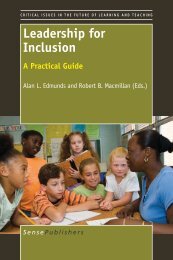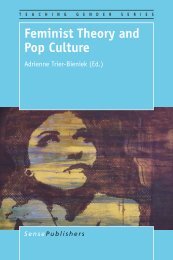1177-threshold-concepts-and-transformational-learning
1177-threshold-concepts-and-transformational-learning
1177-threshold-concepts-and-transformational-learning
- No tags were found...
Create successful ePaper yourself
Turn your PDF publications into a flip-book with our unique Google optimized e-Paper software.
SCHWARTZMANTC: the entityThe term Threshold Concepts covers a variety of denotations, including an approach toteaching, an existing body of scholarship, <strong>and</strong> a structure of community.An approach to teaching. TC is generally understood to mean an orientationtoward supporting student <strong>learning</strong> of deeply challenging material. A concern forstudent <strong>learning</strong>, <strong>and</strong> an emphasis on teaching to support that <strong>learning</strong>, operate asdefining characteristics of this community.A body of scholarship. Two international TC conferences have been held thus far(2006, University of Strathclyde, Glasgow, Scotl<strong>and</strong>; <strong>and</strong> 2008, Queen’s University,Kingston, Ontario, Canada). Presentations were concentrated in several areasspecified by the conference organizers: some analysis, but primarily descriptionof teaching, of liminality, of c<strong>and</strong>idate tc’s within a discipline, <strong>and</strong> of observablestudent behavior; as well as interpretations of liminality through analogy <strong>and</strong>metaphor. TC scholarship is initially developing from a variety of sources in a varietyof what appear as not-necessarily connected directions; an eclectic mix of description,analogy, <strong>and</strong> metaphor.Community structure. The formation, practice, <strong>and</strong> scholarship of the TC communityoccur among a membership of individuals who remain committed to theirrespective disciplines as a primary focus, while also concerned that students learnthe deeply challenging material contained therein. This assemblage of individualsis establishing the TC community as an area of common secondary (or occasionallyco-primary) focus.TOWARD DEFINING A THEORETICAL FOUNDATION:MOTIVATION AND PREPARATIONContent <strong>and</strong> structure of the TC theoretical foundation is shaped by the role(s) oftheory generally in the ongoing development of a field. Content is also shaped byboth the requirements the foundation must satisfy <strong>and</strong> the central question(s) itmust address.The Role(s) of Theory:From the literature. Padfield notes, in considering the relationship betweentheory <strong>and</strong> practice, that [b]enefits of <strong>learning</strong> from experience may not materializewithout the ability to order [that experience] into underst<strong>and</strong>able patterns <strong>and</strong>apply theoretical frameworks (Padfield 1997 p. 91). Most (perhaps all) educatorscurrently drawn to TC are impelled by their experience in teaching disciplinespecificcontent that students find challenging. If some theoretical frameworkorders such experience – both individually <strong>and</strong> collectively – into consistent <strong>and</strong>meaningful patterns, the framework would have value as a communal resource forboth teaching <strong>and</strong> scholarship.24




